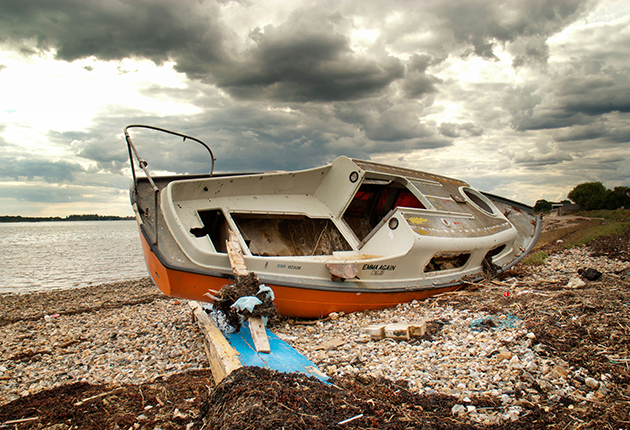The number of abandoned boats around the coasts of the UK and Europe is growing. Now a new initiative is to look at the scale of the problem and improve how end-of-life boats are disposed of
The scale of boat dumping around the UK and North-East Atlantic is to be examined as part of efforts to tackle the growing problem of end-of-life vessels.
Under the new Regional Action Plan on Marine Litter, the UK Government’s Department of the Environment, Food and Rural Affairs (DEFRA) is working with other countries to ‘map the scale of the issue’ across the North-East Atlantic region.
It plans to ‘develop guidance to improve waste management for recreational vessels that are no longer wanted or fit for use,’ said a DEFRA spokesperson.
The Welsh Government is also funding a three year Nature Marine Litter project to raise awareness of abandoned boats, which starts in the autumn.
A senior advisor to Natural Resources Wales, Dawn Beech, said: ‘We are working with partners to increase awareness within the boating community of the financial and environmental impacts of flytipping boats. We are also working to influence end-of-life solutions, as well as tackling existing hotspots.’
A lack of regulation about the disposal of old boats and disposal costs – around £3,000 for a 30ft boat – can result in vessels being dumped.

The cost of disposal is around £100 per foot, so £3,000 for a 30ft yacht. Credit: Boatbreakers.com
They can only be removed if they are a danger to navigation, and often the long process in tracking down an owner means boats degrade and become a threat to the environment.
One of the biggest issues is with GRP boats, as glass reinforced plastic can’t currently be recycled and is instead sent to landfill.
Researchers at the University of Brighton are currently studying microparticle contamination in Chichester Harbour, with the focus on GRP, which has been found to have been injected by marine animals like oysters and mussels.
Often, the cost of responsible disposal has to be picked up by harbour authorities or local councils. Last year, Cornwall’s Port of Truro spent £125,000 to remove two abandoned boats.

Recreational and commercial boats can be found abandoned around the coast of the UK. Credit: Getty
The UK Harbour Masters’ Association said the problem is getting worse, especially in popular sailing areas like the south east and south west, and members are now collating figures on abandoned boats.
‘It’s always been an issue but we have seen an increase post-COVID,’ explained the association’s chief executive, Captain Martin Willis.
‘Many people didn’t have the opportunity to visit their boats and now they have degraded and require a lot of expenditure to get back to a serviceable condition. For boats at the lower end, the option for some is to abandon them. Also the boat buying boom during COVID meant some people bought boats unaware of the attention they require and costs to keep them serviceable and in good condition. Now, with the cost of living squeeze some people are just walking away from their responsibilities.’
Captain Willis said harbours ask for proof of ownership and boat insurance when a yacht is moored there, but this doesn’t help in tracking down boat owners who default on harbour or mooring dues. He would like to see a national registration scheme for boats.
Luke Edney of the UK’s largest boat disposal firm, Boatbreakers, agrees. He says data protection laws means information on ownership can’t be accessed via the Small Ships Register, so a national registration scheme would ‘hopefully push more people to be a bit more responsible’.
Continues below…
What’s the future for derelict GRP boats?
With 9,000 GRP boats abandoned in Europe each year, finding disposal solutions isn't easy. Could new technologies be the answer?…
Support for UK boat scrapping scheme
A solution to the problem of end-of-life boats and how to dispose of them could be on the horizon
Boat building: what will yachts be made from in the future?
Sam Fortescue shines a light on boat building jargon and looks into a future devoid of fibreglass
He would also like to see a sales tax on every boat sale, with the money being centrally held to pay for the recycling of flytipped boats.
‘A boat might be sold five or 10 times, but it will be the last owner who has to foot the bill to get rid of it. It is likely the owner won’t have much money, as he bought a cheap boat, and won’t have the money to dispose of it responsibly,’ said Edney, who says 20% of Boatbreakers work is disposing of abandoned boats.
‘Some people are responsible and after weighing up the cost of mooring fees and maintenance realise it is cost effective to recycle their boat, but ultimately any sort of national scheme would need to be Government funded to work. In France, free-recycling services for boats exist, and all owners have to pay for is the cost of getting the boats there.’

There are concerns that the rise in the cost of living in the UK will result in more abandoned boats. Credit: Boatbreakers.com
Edney said that ultimately, until GRP can be fully recycled, the problem will not go away. Although there has been some success in recycling GRP wind turbine blades, the GRP on boats, due to the different resins and other materials, is more complex.
In 2019, the European Boating Association (EBA) set up a working party to examine the legacy of existing end-of-life GRP and composite boats and how future designs could take into account dismantling and the use of recyclable materials.
It concluded that as well as ensuring boats are designed and built from material which can be reused, recycled and recovered as much as possible, extended producer responsibility should also be introduced.
This could be via a levy on new boat sales to fund disposal or by allowing owners to pass old boats back to their original builders, where possible, who would then dispose of them.
In Wales, abandoned boats can be reported at www.flytippingactionwales.org.
Enjoyed reading New initiative to look at the rise in abandoned boats?
A subscription to Yachting Monthly magazine costs around 40% less than the cover price.
Print and digital editions are available through Magazines Direct – where you can also find the latest deals.
YM is packed with information to help you get the most from your time on the water.
-
-
- Take your seamanship to the next level with tips, advice and skills from our experts
- Impartial in-depth reviews of the latest yachts and equipment
- Cruising guides to help you reach those dream destinations
-
Follow us on Facebook, Twitter and Instagram.







